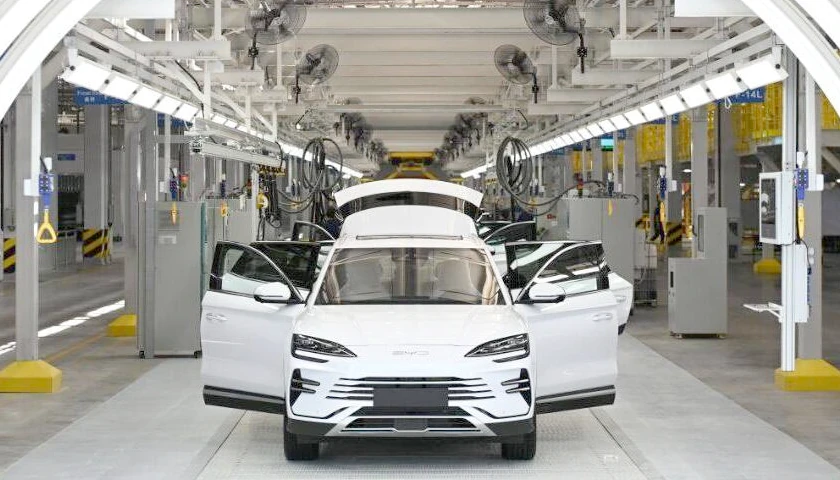by Nick Pope
American automakers will need to make major changes to their businesses if they want to remain competitive with Chinese electric vehicles (EVs) poised to flood the global market, according to analysis published by auto industry consultants.
U.S. manufacturers currently do tens of billions of dollars of business abroad, but Chinese competitors are poised to take over approximately one-third of the global market share by 2030 with particularly strong growth in Europe, South America and Asia driven by EVs and plug-in hybrids, AlixPartners projects in its report.

The auto market is evolving to favor EVs thanks in part to the policy choices of the Biden administration and other Western governments, and the consultancy concludes that American firms need to change course from “business-as-usual” practices if they do not wish to be left behind.
“The global auto industry has been shaped by several inflection points over the past half-century, including the emergence of Japanese production techniques in the 1970s, then the rise of the Koreans, and the more recent disruption caused by Tesla,” Mark Wakefield, global co-leader of the automotive and industrial practice at AlixPartners, said of the analysis. “China is the industry’s new disruptor – capable of creating must-have vehicles that are faster to market, cheaper to buy, advanced on tech and design, and more efficient to build. For traditional [manufacturers], keeping pace with China’s strongest brands will require more than a course correction.”
‘He’s Not Wrong’: Margaret Brennan Presses Buttigieg On Trump’s Stance Over Electric Vehicles Purchasedhttps://t.co/CARe2QlxtX
— Daily Caller (@DailyCaller) May 26, 2024
Specific advantages for Chinese manufacturers include a 35 percent production cost advantage that allow flexibility to blunt the impacts of tariffs, a faster design cycle and a focus on providing drivers with advanced technology features that enhance the user experience, among others, according to AlixPartners’ report. These advantages cumulatively give Chinese automakers a leg up on American competitors in the evolving market.
BYD, China’s biggest auto manufacturer, already started examining options to penetrate the American market via Mexico, and critics of the Biden administration’s EV push have consistently expressed concern that the approach could end up backfiring by empowering Chinese production capable of undercutting the American industry’s biggest players. The administration is concerned about Chinese firms’ ability to do so, as well as unfair trade practices, leading the federal government to impose or strengthen tariffs against EVs, EV batteries and other related products in May.
The Biden administration has finalized a handful of stringent regulations for light-, medium- and heavy-duty vehicles in recent months, including a rule that will require manufacturers to ensure that EVs make up 56 percent of new sales by 2032, with an additional 13 percent of sales being plug-in hybrids by the same year. Additionally, the administration is spending billions of dollars to advance EV adoption, production and infrastructure, but major American firms are losing considerable sums of money on their electric product lines while consumer demand does not appear to be taking off at the rate proponents may have expected.
“Automakers expecting to continue operating under business-as-usual principles are in for more than just a rude awakening – they are headed for obsolescence,” Andrew Bergbaum, global co-leader of the automotive and industrial practice at AlixPartners, said. “The revolution taking place in the global auto industry is driven by the incredible and once unthinkable maturation of Chinese automakers that do a number of things differently.”
– – –
Nick Pope is a reporter at Daily Caller News Foundation.
Photo “BYD Chinese Elective Vehicle” by BYD.





